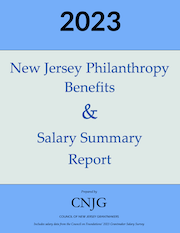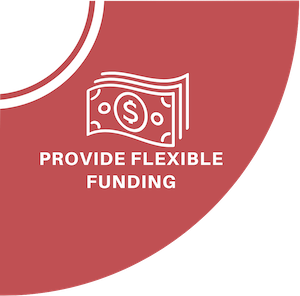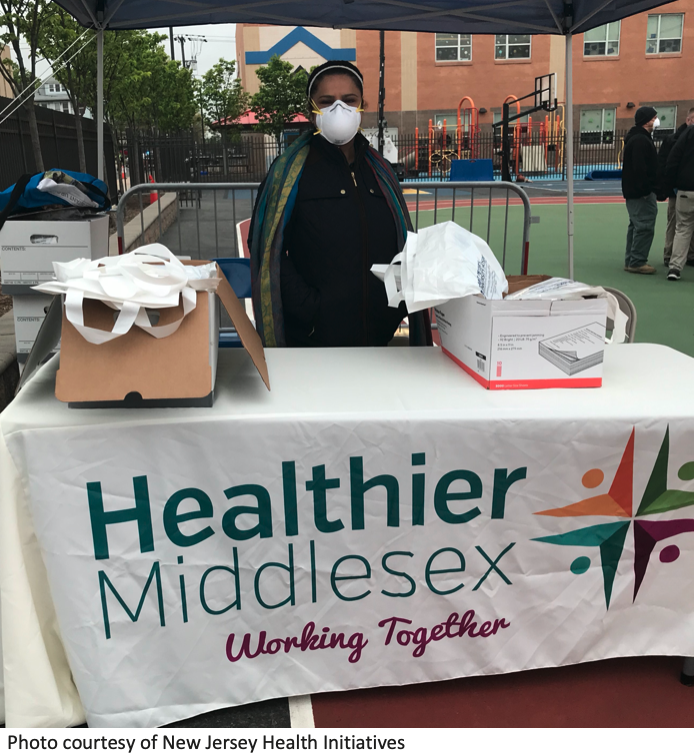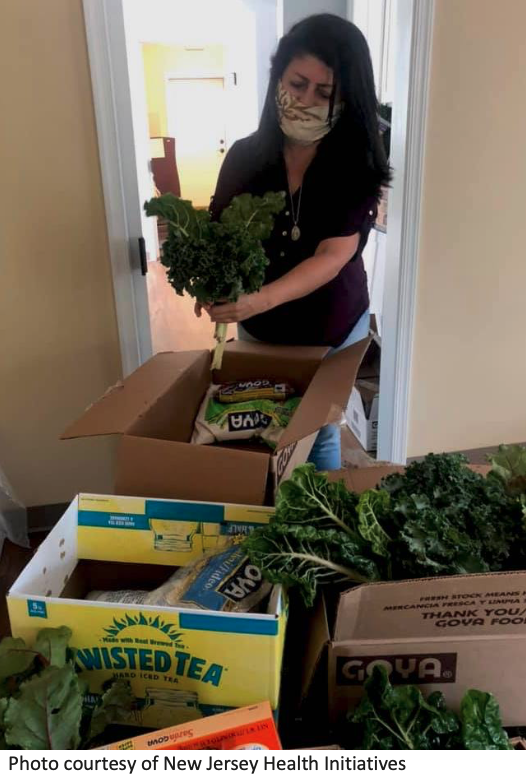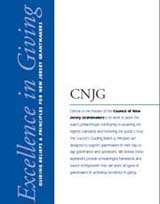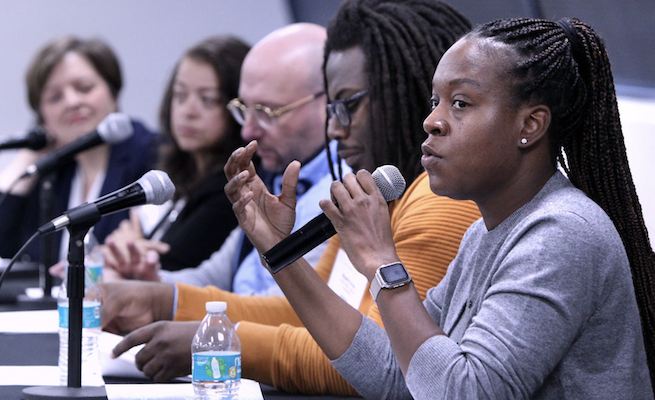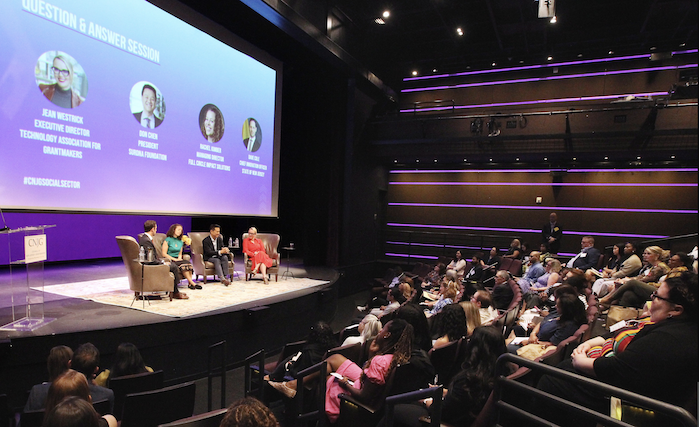Site Search
- resource provided by the Forum Network Knowledgebase.
Search Tip: Search with " " to find exact matches.
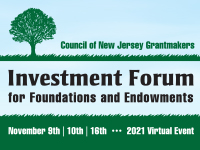
Dates & Times
Tuesday, November 9 - 1:00 to 5:00 p.m.
Wednesday, November 10 - 1:00 to 5:00 p.m.
Tuesday, November 16 - 1:00 to 5:00 p.m.
CEOs, executive directors, CFOs, trustees, investment committee members, and finance managers of foundations and endowed nonprofits gathered together over three afternoons of learning and discussion during CNJG’s 2021 Investment Forum for Foundations and Endowments.
Attendees heard from leading asset managers, financial service institutions, professional advisors and practitioners who shared best practices and valuable insights focused on successful endowment management. Pointed, strategic, and masterful keynote speeches and educational workshop sessions explored a wide range of timely and useful topics, such as impact and ESG investing, gift acceptance policies, alternative investments, governance and due diligence, and so much more.
Sustainable philanthropy thrives on careful and skillful stewardship of the corpus. This signature event grew out of the Council of New Jersey Grantmakers’ Finance and Investment Affinity Group convenings, which have long offered CFO’s, investment committee members, board chairs and others with oversight of their endowment, exposure to a wide range of representatives, as well as thoughtful expertise and perspectives from the investment community.
Access Whova until May 16, 2022!
Registrants can access all three plenary sessions and 11 concurrent sessions on Whova for six months after the event, until May 16, 2022. You can log in with the same email and password you used to access the event. Visit Whova.
For questions, please contact Anna D'Elia, Manager of Programs and Learning.
During 2023, CNJG gathered benefits information from our members to generate our 2023 New Jersey Philanthropy Benefits & Salary Summary Report. Members tell us that this report is one of the most important and effective benchmarking tools for our field. A statistically significant number of members completed our Benefits Report. We are grateful to those that completed the survey, which is a major investment of time, to help us gather this useful data.
The report consists of two sections:
CNJG Benefits Survey
CNJG and our members want specific data about the benefits offered to their employees, board, and more. Therefore, CNJG created our triennial Benefits Survey that gathered this comprehensive data specific to New Jersey’s grantmaking community.
For the second time in this survey’s history, we asked for board and staff demographic data. As more attention is focused on racial equity in our work, it is helpful to benchmark this data in graphical form. We hope it sparks conversation at your organization.
Council on Foundations (CoF) Salary Survey
The salary survey was administered by our partners, the Council on Foundations. This annual nationwide effort by CoF (with the assistance of other Philanthropy-Serving Organizations across the country) benchmarks the salaries of employees at foundations, corporate giving programs, and other philanthropic organizations. CNJG encourages any and all members to complete this survey each year.
Salary information from CoF presents national, mid-Atlantic, and New Jersey data for over 40 staff positions. Salary ranges are only given for positions with five or more reporting organizations. To report on more New Jersey salary data, we hope more members will complete this annual survey.
CNJG reminds our members and other foundations across New Jersey to complete both surveys when they are available – CoF’s is EVERY YEAR, and CNJG’s is every three years. The more data we and CoF can gather, the better and more accurate the results will be for the philanthropic community both in the state and nationally.
Download the 2023 New Jersey Philanthropy Benefits & Salary Survey Summary Report here. You must be a member of CNJG and logged in to access the report.
CNJG's past Summary Reports may be found on our website:
2020 New Jersey Philanthropy Benefits & Salary Survey Summary Report, released in January 2021
2017 New Jersey Foundation Benefits & Salary Summary Report, released in September 2017
2014 New Jersey Foundation Benefits & Salary Summary Report, released in February 2015
2011 Mid-Atlantic Foundation Benefits & Salary Summary Report, released in June 2012
Small BIPOC organizations and/or historically excluded/led
organizations have greater access to funding.
Affirmation: We must center the most marginalized, underfunded, and impactful organizations.
BIPOC, grassroots, and/or historically excluded1 leaders are the most proximate to the populations and communities that face the most pressing social issues and should be central to designing solutions and funded; yet they are often overlooked or ignored as real change-makers.
They are underinvested in by major funders and are often left to struggle on their own; and when they are funded, grants are small and often highly restricted.
Some funders have artificially high budget requirements, require collaboration with larger “more sophisticated” organizations, won’t fund fiscally sponsored groups, or emphasize leadership requirements that are increasingly out of date or exclude vital lived experience.
Community organizations are exploring innovative and egalitarian management structures, such as co-directorships, collectives, and collaboratives, that do not resemble the constructs of the past.
Leadership comes in all structures, sizes, and identities; funders must seek to recognize and fund those who are doing effective work and re-evaluate their views of accepted leadership patterns. For BIPOC, grassroots, and/or historically excluded leaders to succeed, we must provide flexible resources and professional development support while they are leading.
Activities
Below are activities your organization can engage in that will advance your equity focus
• Agree as a community of practice to a shared definition of BIPOC, grassroots, and/or historically excluded-led organizations to foster a common frame of reference to help guide this work.
• Create networking and referral opportunities for BIPOC, grassroots, and/or historically excluded leaders to expand their access to funding and opportunities similar to that of larger, mainstream groups.
• Invest in the development and pipeline of BIPOC, grassroots, and/or historically excluded leaders.
• Remove funding barriers for small BIPOC, grassroots, and/or historically excluded organizations that have traditionally been precluded from funding because of budget size, leadership structure, auditing requirements, and similar obstacles.
• Actively partner with BIPOC, grassroots, and historically excluded organizations to make funding decisions on issues closest to their communities.
• Provide significant, multi-year, general operating funding to organizations and movements led by BIPOC, grassroots, and/or historically excluded communities.
Short-term Outcomes
• Progress is tracked into addressing the barriers to funding BIPOC, grassroots, and historically excluded-led organizations in NJ.
• A greater number of BIPOC, grassroots, and/or historically excluded-led organizations are funded than before, by new and existing funders.
• Professional development and capacity building as requested by BIPOC, grassroots, and/or historically excluded leaders is funded.
Long-term Outcomes
• BIPOC, grassroots, and/or historically excluded leaders can access funding and opportunities similar to that of larger, mainstream groups.
• A greater percentage of support to organizations and movements led by BIPOC, grassroots, and historically excluded communities is provided as significant, multi-year, general operating funding. In this context, “significant” can refer to both the quantity, size or percentage of grants awarded by the funder in any given year.
How to Begin Doing Good Better on Equity
Learning opportunities
• Which criteria and practices are creating, perpetuating or exacerbating exclusion of BIPOC, grassroots, and or historically excluded-led organizations?
• For funders that exclude or limit funding to small organizations, why are these barriers in place? What biases or missed opportunities are resulting from these obstacles?
• When funders are actively prioritizing BIPOC, grassroots, and historically excluded -led organizations in their philanthropic partnerships, what definitions, outreach, and partnership strategies are being used? How has this evolved based on lessons learned?
Pre-Work
• Funders should become educated about how traditional ways of identifying grantees and other criteria often excludes BIPOC, grassroots, and/or historically excluded-led organizations.
• Actively seek and share ways to center, identify, fund, and partner with applicants or community-based partners to create solutions in all efforts.
• Identify forums or protocols for introductions, dialogue, and relationship-building between funding community and BIPOC, grassroots and/or historically excluded-led organizations to pave the way for ongoing or stronger partnerships.
General Operating Support or General Project Support
Affirmation: Funds with the least restrictions are the most valuable
Nonprofits maintain and strengthen their organizations when their funds are unrestricted. Data shows flexible and reliable funding increases impact when nonprofit leaders have control over how funds flow to meet the needs of their constituents and internal operations, as demonstrated during the pandemic when funders released previously restricted funding. General operating support (GOS) funding signals trust in our partners and can open more honest dialogue about meeting the mutual goals of the funder and nonprofit. Funders who make project or program grants should trust the organization and provide flexible funding within a specific program.
Activities
• Over the short term, funders aim to shift their GOS activity by 30%. (30% more grants shift from program to GOS, or from fully restricted to negotiated GOS.)
• Provide grants as unrestricted organizational general operating support. The long-term ideal is for most, if not all, grants to be 100% GOS, unless a funder is legally precluded from doing otherwise.
• For project/program grants, 100% of the grant awarded is unrestricted (negotiated GOS), applying mission-based and mutually negotiated outcomes.
• Nonprofits articulate their organizational vision, strategies and intended outcomes to funders; funders understand the models of their grantee partners and learn from them how the grantee partner's work will lead to change.
• Trust nonprofit partners to know how to best apply their funding.
• Create a shared understanding of the meaning and importance of full-cost budgeting and real-cost funding.
Short-term Outcomes
• 70% of funders are shifting some of their distribution to making general operating support grants.
• 100% of program/project grants are designated unrestricted.
Long-term Outcomes
• 100% of all grants are made without restrictions, unless limited by covenant or donor wishes in the case of community foundations.
• All nonprofits can clearly articulate their vision, strategies, outcomes, and business models to funders; and funders understand them and trust them to know how best to use their funds.
How to Begin Doing Good Better on Flexibility Learning Opportunities
• Why aren’t some funders planning to award GOS or negotiate GOS?
• Ask funders: If you participated in CNJG’s 2022 funder survey and indicated that you planned to initiate GOS, have you done so? • Why are some grants restricted?
• What would it take for funders to change?
Pre-Work
• Seek and share learning opportunities for funders, prioritizing education of foundation boards, to address the barriers to awarding GOS and understand how restricted funding undermines financial sustainability.
• For funders who already regularly provide GOS funding, educate/advocate for others to do the same.
• Learn how GOS/negotiated GOS strengthens grantee partners and the multiple ways they can use and evaluate GOS. Actively seek insights from nonprofits to reinforce the message about GOS in their funding partnerships.
• As an incremental step for funders that are not receptive to GOS, provide education about negotiated general programming support (flexible funding within a mutually agreed-upon program area, as opposed to organization-wide GOS).
• Share promising practices on evaluation of GOS and negotiated GO
Launching New Jersey’s Philanthropy Hub
NJ’s one-stop, most comprehensive source for grantmaking data and nonprofit insights.
Philanthropy is most effective when it is transparent, informed, and collaborative. The New Jersey Philanthropy Hub brings the state’s giving landscape into clear view—empowering funders, nonprofits, and policymakers to strengthen communities, drive innovation, and build a more equitable future for all New Jerseyans.
Developed by Impala and launched by the Council of New Jersey Grantmakers in partnership with the New Jersey Center for Nonprofits, this free, open-access platform provides an unprecedented view of New Jersey’s nonprofit and philanthropic sector.
Jersey-wide Access
All New Jersey-based nonprofits, including all members of CNJG and the New Jersey Center for Nonprofits, receive complimentary access to the NJ Philanthropy Hub and Impala Core through October 2028.
Funders and their nonprofit partners (even grantees in different states) also receive complimentary access to the NJ Philanthropy Hub and Impala Core through October 2028.
What You’ll Find Inside
Comprehensive Landscape View
Profiles of all thousands of New Jersey nonprofits and philanthropic foundations, with financials, staffing, and giving history.
Smart Classification
Explore organizations organized into curated ecosystems, such as environment, health, and education, so you can quickly find peers, partners, or grantees.
Deep Grant Transparency
See every grant awarded to a New Jersey nonprofit, from every foundation across the country, revealing who is funding what and where new opportunities lie.
Clear and Actionable Insights
Track giving flows, spot gaps and overlaps, and benchmark your organization against peers across size, mission, and geography.
Who It’s For
Funders: Discover new grantees, identify funding gaps, and coordinate with peers to maximize impact.
Nonprofits: Showcase your work, connect with funders, and access every grant given to New Jersey nonprofits.
Researchers, Policymakers & Media: Gain clear, comprehensive insights into New Jersey’s philanthropic sector.
Join the Hub!
Sponsor Acknowledgement
CNJG and the New Jersey Center for Nonprofits sincerely thank the following organizations for their crucial support of the NJ Philanthropy Hub that enables us to offer this for free for all nonprofits and funders in New Jersey through October 2028: The Campbell's Company, Community Foundation of New Jersey, Geraldine R. Dodge Foundation, F.M. Kirby Foundation, Grunin Foundation, Princeton Area Community Foundation, PSEG Foundation, and Robert Wood Johnson Foundation.
Join the Council of New Jersey Grantmakers -- your New Jersey-based community of practice for funders!
CNJG supports the philanthropic sector through shared learning, collaborative and trusting relationships, thought leadership, and advocacy efforts. By joining CNJG as a member, your grantmaking organization is connected to dozens of other organizations across the state that give out grants, and you support the work that, in turn, benefits you and New Jersey’s philanthropic sector.
Nonprofits: We recommend you joining the New Jersey Center for Nonprofits, as nonprofit organizations who do not have a grantmaking program are ineligible to join CNJG.
Collaboration. Partnership. Alliance. Joint effort. Collective.
Whatever we call it - every one of us has been involved in a collaboration of some kind at some point in our lives. At the same time, both simple and complex, the definition of collaboration – the act of working together with other people or organizations to create or achieve something – means we collaborate nearly every day. To be human is to collaborate.
We’ll explore the constructs of more complex collaborations at the CNJG 2023 Annual Meeting & Holiday Gathering on December 14. Following the pre-meeting workshop, Tools for Funder Collaboration, the business meeting to elect new trustees, and the networking luncheon, the fireside chat, Sustainable, Effective, and Equitable Collaboration – A Conversation that Centers Community, will feature Nidhi Sahni, Partner and Head of US Advisory Group, Bridgespan, and Lucy Vandenberg, Executive Director, the Schumann Fund for New Jersey, to explore what makes a successful collaboration, and how collaboration strengthens the impact of funding initiatives across sectors.
The Annual Meeting is the place where the seeds of collaboration are often first sown. Consider the collaborations you’re involved with now or have engaged in previously – where did those ideas first take shape – possibly in a conversation with another funder that, like you, wanted to have impact on a particular issue, solve an entrenched problem, or explore an untried solution.
Council members collaborate in a number of ways with other funders and nonprofit organizations. As a prelude to the Annual Meeting, on November 16, we’ll learn about the Morris County Funders Group and their Mental Health First Aid collaborative partnership. This first initiative of the funders group aims to address the growing mental health crisis in young people and adults.
Over 25 years ago, CNJG began its life as a collaboration – New Jersey foundations gathered together to form a collective to learn together, build relationships, and share resources. We have several resources to inform your collaborative journey as part of the Annual Meeting resource tab.
One of our core activities has always been to share resources. As we witness the conflict and heartbreaking devastation and sadness in Israel and Gaza following the October 7 attacks, some key resources to inform your work are available through the Center for Disaster Philanthropy, the go-to resource for disaster-related giving, and the Council on Foundations. You can connect quickly with your CNJG colleagues to share additional resources via our 25 listserves, including the Disaster Response Funders listserve. Contact Director of Member Services Craig Weinrich to join listserves that interest you.
Another joint effort highlighting what happens when funders come together, this time to share their own data, is the 2023 New Jersey Philanthropy Benefits & Salary Summary Report. Thank you to CNJG members that completed the surveys to inform this report.
As part of your registration for the Annual Meeting & Holiday Gathering, you’re asked if you have or are participating in a collaboration. I think it’s safe to say the answer is “YES!” for everyone. Maybe the question we should ask as we speed toward 2024, is where are the additional opportunities for collaborations? How can I build on past or current collaborations? Who else should I invite in?
I’m looking forward to seeing you at the Annual Meeting & Holiday Gathering to further explore these ideas and questions.
Thank you to our Annual Meeting sponsors, Prudential, Victoria Foundation, Robert Wood Johnson Foundation, Devils Youth Foundation, Horizon Blue Cross Blue Shield of New Jersey and the Princeton Area Community Foundation. There’s still time – I hope you will consider sponsorship for this special event – our annual “meeting of members.”
In Partnership,
Theresa Jacks, President and CEO
Council of New Jersey Grantmakers
These news articles show our members’ responses to the coronavirus pandemic, including announcements, emails, blogs, grants and other resources. If you have items to add, please email us.
Actions and Announcements
Audible Creates Global Center for Urban Development and Hires Aisha Glover to Help Lead It
Russell Berrie Foundation Post: Our Response to COVID-19
Campbell Soup to pay hourly employees premium during outbreak
Post: Our Response to COVID-19
Geraldine R. Dodge Foundation
Dodge signs CoF pledge
Grunin Foundation 3/13 COVID-19 Announcement and 3/31 COVID-19 Update
Johnson & Johnson’s lead COVID-19 vaccine candidate shots for early 2021 authorization
Robert Wood Johnson Foundation
Culture of Health Blog: Handwashing to Slow the Coronavirus Pandemic
Opinion: Racism is the other virus sweeping America during this pandemic by Julie Morita, M.D
Opinion: Disabled Americans can’t be a COVID-19 afterthought by Dr. Richard Besser
Culture of Health Blog: Incarceration Rates: A Key Measure of Health in America
Opinion: In Covid-19 Crisis, Philanthropy’s Attention Must Focus on People With Disabilities
Brief: Health Equity Principles for State and Local Leaders in Responding, Reopening & Recovering from COVID-19
Culture of Health Blog: Lessons for an Equitable COVID-19 Response and Recovery
Kessler Foundation has produced two COVID related podcasts:
Practical Tips to Help Survive the Pandemic as a Parent of a Child with Autism
COVID-19 and Spinal Cord Injury: Minimizing Risks for Complications
New Jersey Council of Humanities Op-ed: Staying Human During the Pandemic
New Jersey Health Initiatives’ Deputy Director of Programs, and CNJG Board Member Diane Hagerman penned “Collaboration across county lines is key to a healthy New Jersey” on NJ Spotlight.
New Jersey Council for the Humanities and New Jersey Historical Commission present a webinar series for cultural nonprofits navigating the COVID-19 pandemic
New Jersey Economic Development Authority assists more than 10,000 small businesses impacted by COVID-19
New Jersey State Council on the Arts partners with ArtPride New Jersey Foundation on “Keep Jersey Arts Alive” campaign.
Newark Arts and the City of Newark Retools Its Ambitious Arts Grant Program to Respond to COVID-19
Nicholson Foundation Email to Grantees
Nicholson honors their own Colette Lamothe-Galette, lost to COVID-19
OceanFirst Foundation and Grunin Foundation along with Townsquare Media Launch Acts of Kindness Campaign
Subaru teams up with TerraCycle on PPE recycling
Turrell Fund Email to Grantees about CARES Act
Turrell Fund manages new Passaic County Pandemic Partnership hosted at the Community Foundation of New Jersey
United Way of Greater Mercer County Op-ed message from Sandra Toussaint
Valley National Bank offers Community Pledge CD to help donate and save at the same time
Resources
New Jersey State Council on the Arts Resources for Artists and Arts Organizations
Video: Hear from recognizable native New Jersey voices about the importance of donating to the New Jersey Pandemic Relief Fund
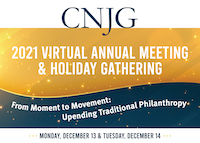
From Moment to Movement: Upending Traditional Philanthropy
Dates & Time:
Monday, December 13 - 2:00 to 3:30 pm -- Annual Meeting Workshop
Tuesday, December 14 - 12:30 to 2:00 pm -- Business Meeting & Keynote Presentation
The Council of New Jersey Grantmakers thanks everyone who attended our 2021 Virtual Annual Meeting & Holiday Gathering.
The 2021 Annual Meeting, From Moment to Movement: Upending Traditional Philanthropy, tackled how we can implement practices based in trust, confront uneven power structures, and advance equity in the philanthropic sector.
Our Annual Meeting Workshop on December 13 explored how two foundations, The Claneil Foundation and Weingart Foundation, are using general operating support, multi-year funding, and transparent communication and feedback to build strong, effective relationships with nonprofit partners. Afterwards, funders discussed where they want to move the needle in their own organization, and the major barriers to implementing those changes.
On Day 2, we heard an inspiring keynote presentation from Marcus Walton, President and CEO of Grantmakers for Effective Organizations (GEO). Marcus kicked off the keynote by sharing critical insights for building trust within and outside your organization. He then engaged in a candid conversation with CNJG President and CEO Maria Vizcarrondo, and answered questions from attendees, on how to reach communities, rethink traditional grantmaking practices, and advance racial equity within philanthropy and New Jersey.
Philanthropy needs to change to meet this moment. Breaking away from ingrained structures and replacing outdated “best practices” with strategies based in trust and power sharing is a long and challenging road for many grantmaking organizations. There will be growing pains. But, during this year’s Annual Meeting & Holiday Gathering, we heard about effective strategies from courageous leaders that have made these changes possible. Join us in 2022 as we continue to rework, reimagine, and operationalize new practices that better serve our partners and communities.
CNJG members can view recordings from the event and additional resources when logged in.
In 2003, with member support, CNJG commissioned a report on the impact a potential conversion of Horizon Blue Cross Blue Shield to a for-profit might have on access to health care in New Jersey. Research from the Center for State Health Policy (CSHP) at Rutgers University, provided details about the law governing such conversions in New Jersey and the experience of other states with conversions. The report identified questions raised in other states when such conversions occur, especially about the valuation of assets, the impact on low-income families, and the operation of the philanthropic foundations that have been established as stewards of the assets generated by the conversions. CNJG’s purpose was to seek answers to critical questions relevant to the availability of healthcare coverage for New Jersey’s citizens and to discuss models of best practice for healthcare conversion foundations across the United States.
This weekly conference call series welcomed New Jersey-based grantmakers along with national funders and provided an opportunity for grantmakers to hear from a wide range of experts in the field of disaster philanthropy. This series started on November 5, 2012, one week after Sandy struck New Jersey, and continued through March 25, 2013. The written summaries of each recording are listed below.
This advocacy and civic engagement toolkit is designed for private foundations that want to educate and encourage their grantees about getting involved in civic and policy activities to increase organizational capacity and impact. While its primary focus is on the grantmaking activity of foundations, the toolkit also addresses rules and guidance for policy involvement by foundation officials acting on behalf of their foundations.
Excellence in Giving
In 2005, CNJG adopted Guiding Beliefs & Principles to offer a thoughtful source of direction and inspiration to help guide our state’s philanthropic sector into the future. CNJG first launched its Excellence in Giving initiative in 2007 with the goal is to provide grantmakers the practical tools necessary to ensure best practice in their operations and grantmaking.
The first booklet, Guiding Beliefs & Principles for New Jersey Grantmakers includes a wealth of insights and tips related to board governance, legal compliance, grantee communications, fiscal responsibility, public disclosure, and many other key areas of foundation governance and operations. It contains wisdom provided by leaders of all types of giving organizations within the CNJG’s membership, and is intended to serve as a practical resource to assist New Jersey foundations in their grantmaking. CNJG’s board is in the process of updating these beliefs and principles in 2023/2024. For more information on the updating process, please contact Theresa Jacks.
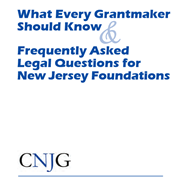 In 2010 CNJG released a second, comprehensive resource to help the state’s philanthropic community understand their ethical, legal, and fiduciary requirements and obligations - What Every Grantmaker Should Know and Frequently Asked Legal Questions. These two booklets are key publications in CNJG’s Excellence In Giving Series. While the Guiding Beliefs & Principles is available publically, members will need to log into access the legal guide for download.
In 2010 CNJG released a second, comprehensive resource to help the state’s philanthropic community understand their ethical, legal, and fiduciary requirements and obligations - What Every Grantmaker Should Know and Frequently Asked Legal Questions. These two booklets are key publications in CNJG’s Excellence In Giving Series. While the Guiding Beliefs & Principles is available publically, members will need to log into access the legal guide for download.
Members can request additional copies of the booklets mentioned on this page by contacting Theresa Jacks.
Inspiring Change through Leadership: Maximizing Philanthropic Impact
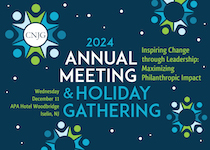 Wednesday, December 11, 2024 - 9:00am to 3:00pm
Wednesday, December 11, 2024 - 9:00am to 3:00pm
Luncheon, Keynote Presentation & Workshop
Location: APA Hotel Woodbridge, 120 Wood Ave S, Iselin, NJ 08830
The Council of New Jersey Grantmakers thanks everyone who attended our 2024 Annual Meeting & Holiday Gathering. On Wednesday, December 11, over 130 Council members and special guests gathered to celebrate the holiday season, welcome new CNJG members, convene our annual business meeting, and feature a dynamic discussion related to the vital work of philanthropy.
The Council’s 2024 Annual Meeting & Holiday Gathering was the place where CNJG members and New Jersey’s philanthropic community came together to share ideas about the important work they’re doing. It also provided a valuable opportunity to connect with colleagues.
This year’s theme, Inspiring Change through Leadership: Maximizing Philanthropic Impact, featured keynote speaker Amalia Brindis Delgado of the Panta Rhea Foundation.
The Annual Meeting included a workshop that explored the New Jersey Principles for Philanthropy. An overview of the Principles was presented, followed by a panel of fellow CNJG members who discussed how they are already using the Principles within their organizations. Attendees also had time to discuss how they could leverage the New Jersey Principles for Philanthropy to make changes within their own organizations.
Annual Meeting Photos
Empowering the Future: Harnessing AI and Data for Philanthropic Social Impact
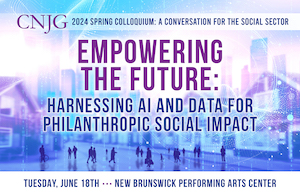
Date: Tuesday, June 18
Time: 9:30 a.m. to 3:30 p.m.
Location
New Brunswick Performing Arts Center
Arthur Laurents Theater
11 Livingston Ave, New Brunswick, NJ 08901
Directions and Parking
On Tuesday, June 18, 2024, the Council of New Jersey Grantmakers held the Spring Colloquium – A Conversation on the Social Sector at the New Brunswick Performing Arts center. This year, we explored the impact of AI and data on philanthropy and the nonprofit sector. Our panel discussion will brought together multiple perspectives to explore how AI can enhance problem-solving without losing human connections, how it affects equity, and how philanthropy has engaged with AI for funding initiatives.
The Technology Association of Grantmakers’ new Executive Director, Jean Westrick, moderated our esteemed panel that included Don Chen, President, Surdna Foundation; Rachel Kimber, Full Circle Solutions; and Dave Cole, State pf New Jersey’s Chief Innovation Officer.
After the panel, Jean Westrick, TAG, facilitated an afternoon session on an AI Framework for Philanthropy. Additionally, the Community Resource Exchange presented an afternoon session on an AI Guide for Nonprofits facilitated by their CEO, Tiloma Jayasinghe, CEO and Jared Carroll, Senior Consultant.
CNJG’s spring colloquium brought together New Jersey grantmakers and nonprofits to connect with each other, Increase their knowledge, learn best practices, find opportunities for collaboration, and to be introduced to new ideas.
Conference Photos
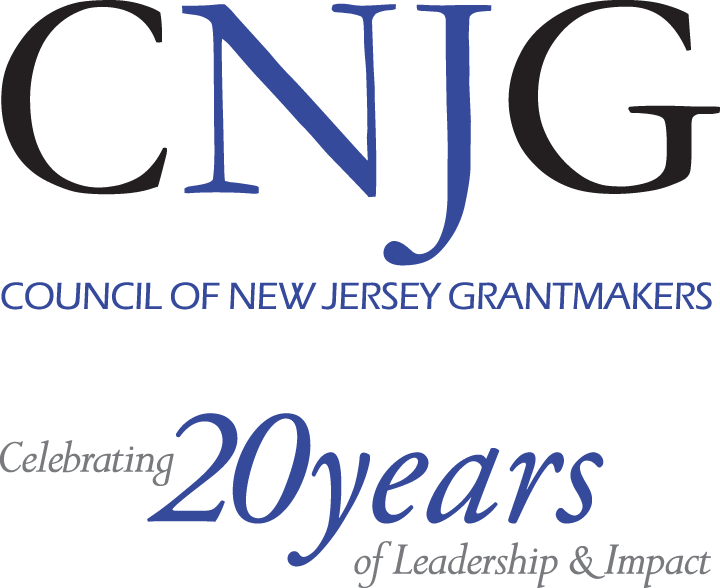 CNJG celebrates its 20th anniversary in 2017 marked by extraordinary progress and service to members over this time. As the nexus for the philanthropic community in New Jersey, the Council of New Jersey Grantmakers’ body of work grows more robust every year. This is clearly evident by the exponential growth in programs and services since CNJG was founded in 1987. However, this proliferation in programs and services does not reflect the full realm of CNJG's transformation over twenty years. CNJG has evolved to become a leader in the state, spearheading important and significant initiatives throughout our history.
CNJG celebrates its 20th anniversary in 2017 marked by extraordinary progress and service to members over this time. As the nexus for the philanthropic community in New Jersey, the Council of New Jersey Grantmakers’ body of work grows more robust every year. This is clearly evident by the exponential growth in programs and services since CNJG was founded in 1987. However, this proliferation in programs and services does not reflect the full realm of CNJG's transformation over twenty years. CNJG has evolved to become a leader in the state, spearheading important and significant initiatives throughout our history.
These programs, services and leadership initiatives elevate, not only our members’ work and practice, but also grantmakers throughout New Jersey, and even beyond. CNJG's success stems from its ability to broker partnerships and alliances to solve problems, leverage shared resources, and forge sustainable solutions to bring about long-term change. During its 20 years, CNJG has grown to become a valuable, highly relevant leadership organization serving a diverse range of funders. View our CNJG Through the Years pictorial. CNJG thanks our members and partners for your ongoing support and leadership that has propelled us through the last 20 years. We look forward to the next twenty!
Newark Philanthropic Liaison
Philanthropy has played a vital role in Newark for decades. In 2007, in collaboration with the Office of the Mayor, CNJG hired the city’s first liaison – modeled after a similar position in the State of Michigan – to harness interest, foster greater effectiveness and attract resources toward policy and programmatic areas that affect Newark’s residents. In the years since, the Council’s Newark Philanthropic Liaison has become a model for the country.
Hurricane Sandy Response
Superstorm Sandy officially came ashore in New Jersey on October 29, 2012 at 8:00 p.m. and its aftermath continues to be felt in communities throughout our state. Not 24 hours after the storm made landfall, CNJG began planning a series of actions to help inform funders what to be prepared for, share information and discuss strategies. CNJG's support of the philanthropic community as it navigates the shifting landscape of disaster recovery, continues.
Facing Our Future
Facing Our Future was a landmark initiative looking at the systemic, long term fiscal challenges facing all levels of government in New Jersey. It grew out of a 2010 briefing CNJG held for members that outlined how a Governor’s budget is annually crafted. CNJG leadership worked with members to convene a group of enthusiastic former government leaders. Their collective experience crossed party lines, and many of them had served multiple New Jersey governors. This Leadership Group included 4 former Attorney Generals, 3, former Commissioners, 2 former State Treasurers, a former Director of the State Senate and a former Chief Justice of the NJ Supreme Court, in addition to leading New Jersey researchers.
Establishing South Jersey’s Community Foundation
The Community Foundation of South Jersey formally launched in 2009 after two years of extensive planning through the efforts of CNJG and a number Council members. CFSJ is dedicated to the southernmost counties of New Jersey - Atlantic, Burlington, Camden, Cape May, Cumberland, Gloucester, Ocean, and Salem. These counties are exceptionally diverse, stretching from rural farm lands to pockets of densely populated and poor urban areas, juxtaposed against wealthy suburban communities. However, they share many of the same social problems – a challenging economy, unengaged youth, access to healthcare, as well as issues related to hunger, unemployment and housing. Realizing the need, Council members through the work of CNJG formed The Community Foundation of South Jersey. CNJG is extremely proud to have played a role in building the foundation to serve South Jersey for generations to come.
Spring Colloquium
Held for the first time in 2008, CNJG's Spring Colloquium focuses on critical trends and issues affecting foundations and the people and communities they serve. Past discussions have featured Governor Tom Kean with US Editor for the Economist Matthew Bishop, writer David Borestein and philosopher Anthony Appiah, and Idealist.org founder Ami Dar with Cindy Rizzo of the Arcus Foundation.
Spring Conference
CNJG's Conference for Grantmakers brings together staff and trustees of all types and sizes of foundations for a day of networking and focused sessions dealing with key aspects of grantmaking, leadership, and management and operations.
As we enter the spring months, I want to let you know that registration has now opened for CNJG’s 2025 Conference for the Social Sector —Stronger Together: Philanthropy & Civic Engagement!
This very special convening on June 18 will bring together funders and nonprofits for a full day of shared learning, exchange, and networking. Our conference features national and local thought leaders, and a range of experts, for a day of connection, not-to-be-missed discussion, and side-by-side learning with foundation and nonprofit colleagues.
We’re pleased to announce our keynote speaker, Dale R. Anglin, Director, Press Forward, a growing coalition of 88+ local and national funders committed to investing more than $500 million to strengthen communities through local news. Press Forward now includes 36 locally led chapters in 29 states, including one in our state — the New Jersey Civic Information Consortium.
This is CNJG's largest event of the year and your chance to join us as we examine how funders and nonprofits can work together to address and increase civic engagement, focusing on several key areas, including advocacy, local media, participatory budgeting, guaranteed income, public-private partnerships, the arts, and youth education through the lens of civic participation. Special early bird rates are available until April 12 – so please register soon.
We’re thrilled to have PSEG as our Signature Sponsor, Sixers Youth Foundation as a Collaborator Sponsor, and the Robert Wood Johnson Foundation as a Connector Sponsor. We have several opportunities available to support this very special event, and I hope you will consider sponsorship. Please reach out to Development Associate Fortunata Cuomo for more information.
In case you missed it, we recently launched the Funder Briefing Series: Making Sense of Federal Policy: Understanding What it Means for New Jersey. This series provides an overview of key issues that directly impact philanthropy, and more broadly, the charitable sector. The next session, on April 3 at 4:00 p.m., will focus on Education. There’s still time to register for the program.
And for your planning, the next briefings in this series are:
- April 10: Making Sense of Federal Policy: Understanding What it Means for NJ: Housing
- April 17: Making Sense of Federal Policy: Understanding What it Means for NJ: Media & Journalism
- April 24: Making Sense of Federal Policy: Understanding What it Means for NJ: Arts
We recorded the last three briefings in this series in case you missed them. We’re also creating a written summary for each briefing as another way for you to review the information. You must be logged in to access the recordings, summary documents, and resources.
- Making Sense of Federal Policy: Understanding What it Means for NJ: Immigration
- Making Sense of Federal Policy: Understanding What it Means for NJ: Health
- Making Sense of Federal Policy: Understanding What it Means for NJ: Environment
We believe that active participation in CNJG programs is essential for all members, their staff and trustees. Therefore, we strongly encourage you to attend and to share our programs with your staff and trustees.
The federal funding rollbacks and executive actions continue to harm nonprofits and the work they’ve built across education, healthcare, science, the arts, public media, climate, immigration, gender and racial justice, and countless other issue areas that are at stake. Foundation leaders and funders are exploring ways to respond and step up. The Trust-Based Philanthropy project, along with Grantmakers for Effective Organizations and the National Center for Family Philanthropy, coordinated a call-to-action for philanthropy to “meet the moment.” While philanthropy can’t replace federal funding, funders can “work together to move in solidarity with nonprofits, mobilize money in trust-based ways, and nurture possibility and innovation.” I invite you to join our colleagues from across the county in signing this pledge to be part of the solution.
In a recent NJ Spotlight News op-ed entitled “NJ nonprofits need your help,” Linda Czipo, President and CEO, New Jersey Center for Nonprofits, reminds us:
There is a good chance that your life has been made better because of a nonprofit… Perhaps you were born, gave birth, or received life-saving treatment at a nonprofit hospital. Maybe you learned from “Mister Rogers,” “Sesame Street” or other shows developed by nonprofits. You may have enrolled your children in childcare or after-school programs so you could go to work. You may have been uplifted, moved, or inspired by a performance at a nonprofit theater….It’s easy to take the helpers for granted; after all, they’ve always been there in our hour of need. But now it’s the helpers who need help.
It's clear we’re in a time of uncertainty, and we’re wading into deeply uncharted waters. Philanthropy has a role to play, and CNJG is here to help navigate and inform your work. In addition to the learning series, we are curating resources, information, webinars, and convenings, as well as sharing CNJG member actions, New Jersey-focused response funds, and more via the Executive Actions Response & Info tab. Please check back often. And please help us keep the information current and updated by sharing your actions and stories with Manager of Communications Shakirat Odunsi.
If you’re hearing of surveys to gather information from NJ nonprofits, please share that information with us as well. Having the latest information supports thoughtful collaboration and decision-making in times of change.
The bottom line is, we must stand together with our nonprofit partners, do our part, and take courageous action now.
On your side,
Theresa Jacks, President and CEO
Council of New Jersey Grantmakers
It’s summer – and that means summer reading! Whether you’re reading at home or in the coffee shop, at the beach, or while traveling by train or airplane, I'm thrilled to share a collection of summer reading recommendations from CNJG’s Board of Trustees and staff. While some recommendations speak directly to philanthropy and the social sector, others explore leadership, civic engagement, economics, and personal growth, all offering insights and ideas to excite our curiosity and inspire us.
Board Chair Craig Drinkard has been re-reading the timeless classic Good to Great by Jim Collins. Craig shared that so much more is resonating this time around as he re-reads it. The first time he read the book, the theory is what stood out; this time it’s deeper, more strategic, and thought provoking, with fresh insights gained during this second look. This book is worth a read for everyone dedicated to leadership and organizational improvement.
First Vice Chair, Justin Kiczek continues to be inspired by our recent convening, 2025 Conference for the Social Sector - Stronger Together: Philanthropy & Civic Engagementand recommends Habits of Heart and Mind: How to Fortify Civic Culture from Our Common Purpose - a publication he says has been a "continued source of wisdom and good ideas" and passes on to pretty much anyone he knows! He also follows two Substack columns focused on civic culture and renewal: Daniel Stid’s The Art of Association and Gabe Lerner’s Democracy Notes.
Treasurer Catherine Wilson has been diving into a diverse reading list including Autocracy, Inc.by Anne Applebaum, The Art of More: How Mathematics Created Civilization by Michael Brooks, and The Heat Will Kill You First: Life and Death on a Scorched Planet by Jeff Goodell.
Also from our board members:
Paul DiLorenzo is catching up on his back-dated New Yorker magazines and especially loved a story called Amelia Earhart’s Reckless Final Flights.
Maisha Simmons recommends checking out this insightful blog post: The Challenge and Opportunity for Funder and Nonprofit Listening Right Now.
Tammy Rice Herman has been reading the weekly blog, "Better Allies" where author Karen Catlin shares five simple actions each week to create a more inclusive and engaging workplace. You can sign up here to receive the blog every Friday.
Margarethe Laurenzi recommends listening to Ann Patchett at Parnassus Books talk about all the great books being written that serve as a rebuttal to the idea that literary fiction has lost its way.
Jasmyne Beckford has been enjoying reading Choosing Purposeful Alignment: The Messy Middle of Transformation. The book really speaks to her, “because it’s all about how growth happens in that uncertain, messy middle where you have to keep choosing what aligns with your values.”
Lucy Vandenberg’s summer reading and all year round includes her “daily devouring of The New York Times and NJ Spotlight!”
The CNJG team has a few reading recommendations for you too!
Senior Director, Member Experience, Craig Weinrich recommends Doughnut Economics by Kate Raworth, who argues that GDP should no longer be the sole indicator for a nation’s (and the world’s) economic health. Measuring something as complex as an economy needs an updated tool – thus the doughnut model that includes social and ecological benefits and harms, resulting from economic activity.
Manager of Programs and Learning, Chanika Svetvilas is currently reading Systemic: How Racism Is Making Us Sick by Layla Liverpool. She notes Liverpool's observation that “Racism is an insidious threat to our health precisely because it is so easily overlooked or, in some cases, perhaps willfully ignored.”
Manager of Communications Shakirat Odunsi picked up two books at United Philanthropy Forum’s UnConference last month: Future Good: How to Use Futurism to Save the Worldby Trista Harris and A New Era of Philanthropy by Dimple Abichandani. These picks reflect her interest in how our sector can evolve and adapt. Harris's work explores how futurist thinking can be applied to social change, while Abichandani's book examines the transformation happening in philanthropic practices and approaches. Both seem perfectly timed for those of us thinking about where philanthropy is headed next.
For my own summer reading, I've been reassured by reading Who is Government? The Untold Story of Public Service edited by Michael Lewis – the stories of the real women and men working in the public sector without bravado and bluster. These are the civil servants that oversee our veterans’ cemeteries, explore our universe, hunt down cyber criminals and preserve our archives. These unsung heroes do the daily, unseen, yet necessary work of the people. “Although they often go unnoticed, public servants are the heartbeat of our nation.”
I also recently read, Meditations for Mortals - Four Weeks to Embrace Your Limitations and Make Time for What Counts by Oliver Burkeman. I plan on re-reading it so I can gain some deeper insights during my upcoming sabbatical.
Yes – that’s correct - I will be on sabbatical beginning Monday, August 11, and will return to the office on Tuesday, October 14! I started my journey at CNJG in May 2008. I’m grateful to the CNJG Board of Trustees for giving me this opportunity, and grateful to an incredibly dedicated and competent team that will ensure work of the Council continues during my absence! Thank you!
Special thanks to Craig Weinrich, who will be the senior executive in charge, while I am on sabbatical. Please feel free to reach out to Office Manager Dana Schwartz, as well, at [email protected].
I'm struck by the breadth and depth of what our community is reading, from civic engagement and economic models to health equity and the future of philanthropy. These recommendations reflect the commitment to continuous and shared learning that makes our CNJG community so special. I’m looking forward to exploring some of these recommendations during my time away. And in case you missed it, the annual CNJG 2024 President's Report also celebrates what makes our CNJG community so special!
With appreciation,
Theresa Jacks, President and CEO
Council of New Jersey Grantmakers
Igniting Equitable Systems Change Together
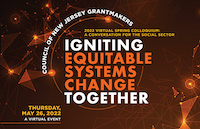
Date: Thursday, May 26
Time: 1:00 to 5:00 p.m.
On May 26, the Council brought together recognized thought leaders from philanthropy and nonprofits for a conversation exploring how the social sector can advance systems change.
Grantmakers and nonprofits grapple with complex, structural issues every day, and take on the difficult questions to move our collective work forward.
During a dynamic discussion, panelists shared strategies to empower proximate leaders, remove structural barriers and build the capacity of grassroots organizations, and shift mental models to challenge assumptions and strengthen nonprofit-funder relationships. After the panel, case study presenters highlighted three local examples of systems change, emphasizing the importance of cross-sector collaboration, collective action, and community engagement. Then, attendees gathered together for small group discussions to unpack key takeaways and discuss their own successes and challenges with systems change.
One of the most highly regarded convenings for social sector leaders in the state, the 2022 Virtual Spring Colloquium considered the power and cultural shifts needed to advance systems change through philanthropic and nonprofit partnership.
Attendees can revisit Whova to access event features such as session recordings, exhibitor virtual booths and sponsor pages, NJ Poetry Out Loud performances, and more.
| Agenda | |
| 1:00 - 1:30 pm: | Opening Session Featuring Sponsors & Exhibitors |
| 1:30 - 2:00 pm: | Break & Independently Visit with Sponsors & Exhibitor Virtual Booths |
| 2:00 - 3:30 pm: | Panel Discussion & Case Study Presentations - Igniting Equitable Systems Change Together |
| 3:30 - 4:00 pm: | Small Group Discussions |
| 4:00 - 4:15 pm: | Break & Independently Visit with Sponsors & Exhibitor Virtual Booths |
| 4:15 - 5:00 pm: | Networking Reception Featuring NJ Trivia |
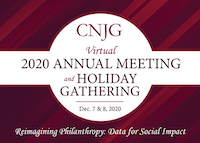
Please Log In to view resources from this event.
Reimagining Philanthropy: Data for Social Impact
Held:
Monday, December 7 - 2:00 to 3:30 pm -- Skill-Building Workshop
Tuesday, December 8 - 12:30 to 2:00 pm -- Business Meeting & Keynote Presentation
Thank you to everyone who attended CNJG’s first ever virtual Annual Meeting & Holiday Gathering. This year’s meeting focused on the many ways philanthropy can use data for social impact.
Data science is a powerful tool to address housing and food insecurity, education inequality, health disparities, civic injustice, and other longstanding social issues that continue to intensify during the pandemic. Building data capacity equips local leaders with information to develop and advocate for more effective policies. New evaluation strategies can outperform outdated processes that reinforce inequities and slow progress. Research and technology that fuels innovation in the private sector can help nonprofit and government organizations drive impact in New Jersey communities..
On Day 1, the Annual Meeting Workshop focused on evaluation and learning practices that center equity and social impact. And on Day 2, Keynote panelists shared how data science can help connect people to services, address racial inequity, and create greater impact in our communities during the pandemic and beyond..
Philanthropy can’t go back to “normal,” because normal wasn’t good enough. During this year’s Virtual 2020 Annual Meeting & Holiday Gathering we explored how we can reimagine philanthropy by harnessing the full power of data for social impact.
The Council of New Jersey Grantmakers would like to thank our sponsors for their generous support: Signature Sponsors – Novartis and PSEG; Sustaining Sponsors – Prudential and Horizon Blue Cross Blue Shield of New Jersey; Collaborating Sponsor – Robert Wood Johnson Foundation; and Performance Sponsor – The Provident Bank Foundation.

